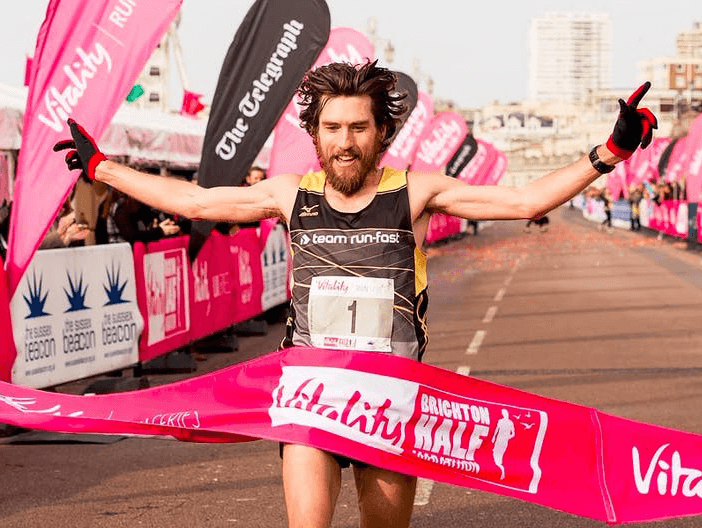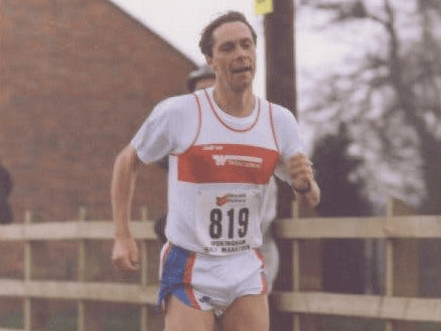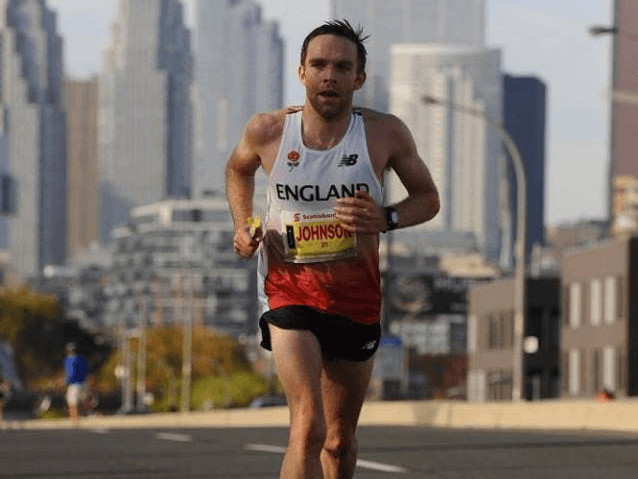Q&A WITH PAUL MARTELLETTI, 2:16 MARATHONER & GB INTERNATIONAL
Stats:
100k PB: 6:57:22
50k PB: 2:50:11
Marathon PB: 2:16:49
Half marathon PB: 1:04:18
10k PB: 29:26
5k PB: 14:19
Intro
Paul is a prolific racer who has represented GB and has won a plethora of races from 5k to 100k. I’ve known Paul for the past 5 years or so and I’ve learned a lot from him from both a physio perspective and in terms of how he approaches training and racing. Paul is incredibly resilient, especially considering the volume of training and racing that he does (partly explained by this article). Commonly I won’t see Paul in clinic for a several months but when a niggle arises I’ll see a lot of him for as long as is needed. In my eyes, he’s one of the nicest people that you’ll meet, good fun to work with, and incredibly humble about his achievements.
Paul has kindly answered a few questions about his journey into athletics and his training.
How did you get involved in athletics?
I guess rugby was my main focus at school but I always had a natural talent when it came to running. I would always do well at the school sports day and I remember one year winning the 400m, 800m, 1500m, long jump, and high jump (also part of the winning 4x100m team) and I came second in the 200m and shotput! The school athletics success meant I went on to compete at regional level competitions (county-equivalent in NZ) where I stuck to running my best events of 400m and 800m and I would often win these too.
I had a couple of seasons where I trained somewhat seriously for the 400m but I was never serious enough to reach my full potential as I was having far too much fun being an unruly teenager! When I left school, I continued to play rugby in social teams (basically organised drinking!) and didn’t really do any kind of running for about 10 years.
How did you progress/get into marathon running?
After my 10-year break, I started doing a bit of running to help get fit and lose a bit of weight as I was coming in at a stocky 85kg. I was running 1 or 2 times a week and eventually ran my first half marathon in 88 minutes and a year later ran 84 minutes. I remember saying that I’d never run a marathon as I’d have to run for at least 3 hours and that wasn’t very appealing! It wasn’t until I came to the UK that I started running slightly more as I was running home from work every couple of days. I had no idea what I was doing and would always try to run as fast as I could, trying to beat my last time. I was inadvertently making every run a tempo run!
One of my work colleagues suggested we should run the London marathon and I found out that I could get an entry via the Good For Age route, provided I could run a qualifying marathon in under 3 hours. I was pretty naive about it all which I’m sure played into my hands, and 4 weeks later with 2 (very recent!) long runs under my belt (I needed to prove to myself that I could run for nearly 3 hours) I ended up running 2:58 and got the Good For Age time I needed. 7 months later and with a bit more running and more structured training I ran 2:28 at the London marathon. It wasn’t until then that I realised I might be ok at this running thing and I’ve been trying to better myself and run faster ever since.
What would a typical training week in a build-up to a marathon look like?
I’m quite fluid with what days I do my workouts as it depends on how I feel, what else is going on in life, and also who else is around to run with. I try to get in a marathon specific workout which will progress over the weeks in terms of distance and pace. For example, early on I might do 6x3km, progressing to 4x5km, then to 3x7km, all off a 1km float recovery. This can end up being around 14-15 miles and with a warm-up and warm-down it can get closer to 20 miles.
I’ll also mix in some marathon pace without the float recovery as it’s a great way to simulate the race where you can practise taking on drinks and also it’s a good confidence boost to be able to run 60-90 minutes uninterrupted at marathon pace, hopefully feeling good! This is the most important workout for me so I make sure I’ve had a couple of easier days so I can do the workout justice.
I’ll also try to do something shorter and sharper and this can be a lighter track session like 6x800m or a time-based fartlek like 10x2mins off 2mins jog just to get the legs turning over and not stressing about the distance/pace.
The last workout of the week is the long run and this can vary based on what I did the day before as there’s a good chance I may have done a track race, parkrun, or XC on the Saturday so if I’m feeling a bit beat up I’ll just get the miles in and not worry about the pace. If I’m feeling fresh enough then I’ll pick up the pace on this run so it’s steadier i.e. marathon pace + 30-60secs.
In total, I’m usually hitting 100-110 miles as the other days are just easy and I’m usually running twice a day often as a to and from work commute which is a great way to get the miles in. I also like to get a good 4-6 week block in with some higher mileage in the 120-130 range as I find the extra mileage helps set me up with a strong base.
What sort of races do you like to include in a marathon build-up and how far out from race day?
I just love to race and, in the past, I would race everything I could from half marathons 2 weeks out, to 10kms 1 week out from a big marathon. Now I’m older and marginally wiser I don’t overdo it as much. For me, racing is a really good shortcut to get into great shape.
The risk is if your body can’t handle it then it will take longer to recover, thus compromising your training, and worst case injure yourself as you try to keep the set schedule without having recovered enough. Loads of people love to bang out a half marathon PB attempt 3-6 weeks before the big day to prove that the training they have been slaving over for the past 10-16 weeks is paying off.
I’m one of them who likes to get in a half, but I’ve also learnt not to read too much into these races as very seldom will you go into the race feeling fresh. It’s different for everyone and for people on a bit of an improvement curve that inevitably comes about due to marathon training will no doubt smash their times with ease.
The only other thing I do frequently before a big race would be to try to smash out a fast parkrun. I know I’ll be sufficiently rested having done a week or so slightly easier as part of my taper, I know I’ll recover easily as it’s only 5km, and I know that I’m not even training for a 5km so if I can run pretty fast for that then I must be in ok shape for the event I’m actually training for.
How much rest and sleep do you get when you are in a marathon build up?
I try to get as much sleep as I can and that typically means a minimum of 8 hours a night. Sleep is super important for recovery and it is often overlooked as we tend to burn the candle at both ends with our busy lives – well maybe not so much now #covidlockdown!
Do you follow a specific diet when training?
In short, no! I basically eat anything and so long as I’m not gaining weight then I figure I’m eating the right amount. Despite running 100+ miles per week I find it very difficult to lose weight so when it comes closer to a big race, I try to control myself a little more so I can shed those few extra pounds and get down to race weight. The only thing I’ll do in training perhaps increases my carb intake a day or two ahead if I know I’ve got a hard workout coming up.
Do you complete regular strength and conditioning exercises?
No! I’m laughably inflexible which makes it difficult to feel like I’m being productive when I do try to do these things. My body used to be very robust and I got away with just running but as the years tick by I’m finding I get a few more niggles here and there and I don’t bounce back as well as I used to. So I really need to motivate myself to do something here. I have recurring problem areas that I need to stay on top of, so this is as close as I get to being regular as I tend to only do S&C when I need to.
What role does physio / massage /osteo play in your training?
I don’t do these things as often as I should and like the strength/exercises above I’m usually more reactive than proactive. Physio is great when I do get a niggle as it means I can get an expert opinion and get on top of it before it starts to impact my training.
It’s also much more informed than my old go-to niggle fix which was to punish it with some tempo running! There was some logic behind this theory as running faster meant a different gait/style and sometimes the issue was with running slower. Probably best to not try this one at home!
Do you rotate your footwear for different sessions throughout the week?
I generally have one pair of more traditional mileage shoes for the majority of my running and use lighter/racing shoes for workouts. The mileage shoes often last for at least 1200 miles which somewhat goes against industry advice (though if the advice is coming from shoe companies then I’m somewhat sceptical!). The main thing for me is if the wear pattern on the sole is pretty even then they are still good to go. If you’re not blessed with a relatively nice even wear pattern, then you shouldn’t be getting as many miles out of shoes as over time the wear will be compounding your uneven-ness which increases your injury risk.
Do you have any mental preparation strategies for your racing?
For a big marathon I like to write down a race plan as that helps me focus on the task at hand. Things like keep the first mile under control with a 5:10-5:15, keep within 5-10secs of 5km target splits, and wait until 20 miles before thinking about speeding up (if possible!).
It helps to contain the excitement at the start of a race where it is far too easy to set off too fast since it feels so easy and it keeps you busy thinking about your goal and hopefully staying on track. Another useful strategy is to think back to your hard workouts and draw from the confidence you had by completing them. This can be useful during the taper when you start to doubt yourself and your goals. The last one I often do is some simple visualisation where I’m running the race, and everything is feeling great and I’m on track for my target time just to reinforce what I should be doing on race day!
How have you adapted your training and goals with the current COVID-19 restrictions in place?
Since the UK went into lockdown I have been an obedient citizen and have only been out running once a day, but I make sure I get my monies worth for that one run! The once a day runs are usually 13-17 miles which is similar to the mileage I’d do when running twice a day. If anything, I’m running a little more as with no races on the horizon it’s meant I’ve been able to have a bit of fun with some extra-long runs.
My last 6 long runs have been 31, 28, 28, 31, 26, 41 miles and my weekly total from running once a day has been 122, 126, 126, 131, 142 miles. So, it’s safe to say I’m in pretty good shape for an ultra run right now and I’m in the early stages of scheming a way to put my training to good use soon. Stay tuned!!
I hope that you found Paul’s training insight interesting.
If you’re having any niggles or if you’re interested in improving your performance and would like to be connected with a UKA qualified coach, then get in touch with me at scott@londonrunningphysio.com
Happy running and keep safe.
Cheers
Scott



